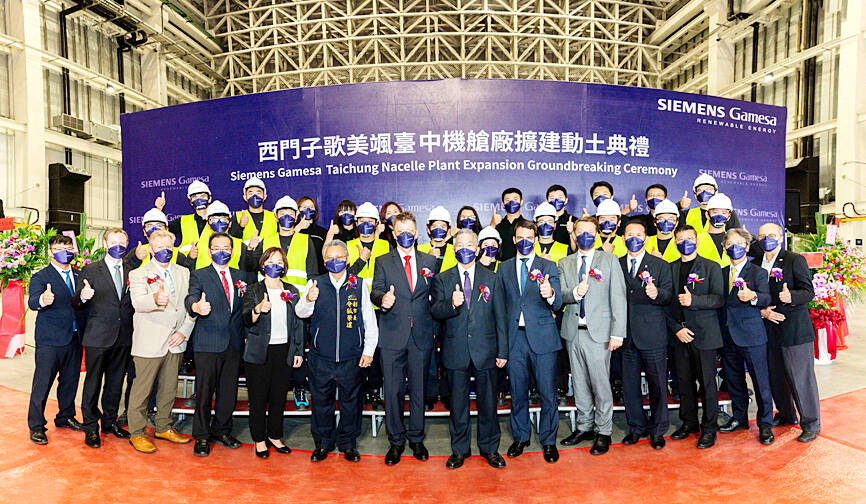Wind turbine manufacturer Siemens Gamesa Renewable Energy SA on Wednesday broke ground on an expansion of its nacelle assembly plant at the Port of Taichung, which is expected to more than triple the number of the company’s local employees, it said in a statement.
“We are thrilled to triple our activities in Taichung and to be leading the Taiwanese offshore revolution,” Marc Becker, CEO of Siemens Gamesa’s offshore business, said in the statement.
The company aims to make the Taichung plant “the centerpiece of our Asia-Pacific offshore manufacturing activities,” Becker added.

Photo courtesy of Siemens Gemesa Renewable Energy SA
The Siemens Gamesa nacelle plant launched in Taichung last year is the largest production facility of its kind in Taiwan, with the first locally made nacelles being provided to Orsted A/S’ 900 megawatt Greater Changhua 1 and 2a offshore wind farms projects.
The expansion is expected to boost the plant’s annual production capacity to 2 gigawatts, with the addition of two new production halls and a new warehouse, the company said.
The new facilities are to have dedicated production lines for hub assembly, nacelle backend assembly and final nacelle assembly, including generator-related work, it said.
Siemens Gamesa said it plans to start assembly of its latest SG 14-222 DD nacelles at the Taichung plant in the second quarter of 2024, and open up opportunities for a vast range of Taiwanese suppliers to feed more than 10,000 components needed for the new nacelles.
With a larger capacity, the plant is intended to deliver locally made nacelles for the 1.044 gigawatt Hai Long offshore wind power project, future projects from the government’s stage 3 offshore wind farm development plan, and other projects in the Asia-Pacific region, the company said.
“With the factory expansion, we are looking forward to leveraging this local footprint together with the Taiwanese supply chain, building a regional offshore wind manufacturing powerhouse based in Taiwan,” Siemens Gamesa Offshore for Asia-Pacific general manager Niels Steenberg said in the statement.
Siemens Gamesa is scheduled to send its first batch of Taiwanese employees for training in Europe beginning next month, it said.
Training involves three months at Siemens Gamesa’s offshore wind turbine factory in Brande, Denmark, and next year they are to receive on-the-job training alongside nacelle assembly colleagues in Cuxhaven, Germany, it said.

Semiconductor shares in China surged yesterday after Reuters reported the US had ordered chipmaking giant Taiwan Semiconductor Manufacturing Co (TSMC, 台積電) to halt shipments of advanced chips to Chinese customers, which investors believe could accelerate Beijing’s self-reliance efforts. TSMC yesterday started to suspend shipments of certain sophisticated chips to some Chinese clients after receiving a letter from the US Department of Commerce imposing export restrictions on those products, Reuters reported on Sunday, citing an unnamed source. The US imposed export restrictions on TSMC’s 7-nanometer or more advanced designs, Reuters reported. Investors figured that would encourage authorities to support China’s industry and bought shares

TECH WAR CONTINUES: The suspension of TSMC AI chips and GPUs would be a heavy blow to China’s chip designers and would affect its competitive edge Taiwan Semiconductor Manufacturing Co (TSMC, 台積電), the world’s biggest contract chipmaker, is reportedly to halt supply of artificial intelligence (AI) chips and graphics processing units (GPUs) made on 7-nanometer or more advanced process technologies from next week in order to comply with US Department of Commerce rules. TSMC has sent e-mails to its Chinese AI customers, informing them about the suspension starting on Monday, Chinese online news outlet Ijiwei.com (愛集微) reported yesterday. The US Department of Commerce has not formally unveiled further semiconductor measures against China yet. “TSMC does not comment on market rumors. TSMC is a law-abiding company and we are

FLEXIBLE: Taiwan can develop its own ground station equipment, and has highly competitive manufacturers and suppliers with diversified production, the MOEA said The Ministry of Economic Affairs (MOEA) yesterday disputed reports that suppliers to US-based Space Exploration Technologies Corp (SpaceX) had been asked to move production out of Taiwan. Reuters had reported on Tuesday last week that Elon Musk-owned SpaceX had asked their manufacturers to produce outside of Taiwan given geopolitical risks and that at least one Taiwanese supplier had been pushed to relocate production to Vietnam. SpaceX’s requests place a renewed focus on the contentious relationship Musk has had with Taiwan, especially after he said last year that Taiwan is an “integral part” of China, sparking sharp criticism from Taiwanese authorities. The ministry said

US President Joe Biden’s administration is racing to complete CHIPS and Science Act agreements with companies such as Intel Corp and Samsung Electronics Co, aiming to shore up one of its signature initiatives before US president-elect Donald Trump enters the White House. The US Department of Commerce has allocated more than 90 percent of the US$39 billion in grants under the act, a landmark law enacted in 2022 designed to rebuild the domestic chip industry. However, the agency has only announced one binding agreement so far. The next two months would prove critical for more than 20 companies still in the process